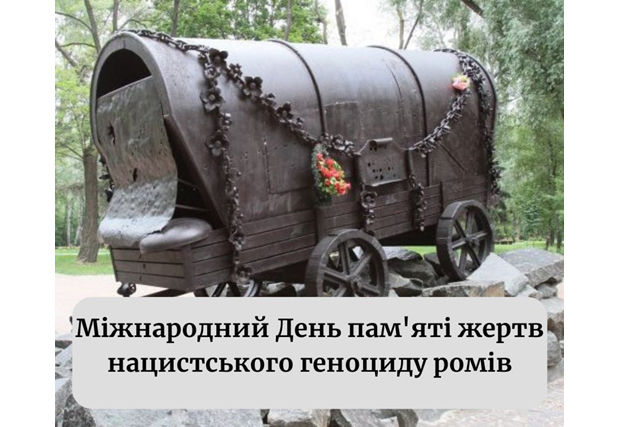The Roma Holocaust Memorial Day
 On August 2, the memory of the victims of the Nazi genocide of the Roma is commemorated at the international level. This date is a tribute to those who died as a result of genocide during the Second World War. On the night of August 2-3, 1944, about three thousand Roma, including children and the elderly, were burned alive in the gas chambers of the Auschwitz-Birkenau death camp. Probably between 300,000 and 500,000 Roma died during National Socialism. In total, more than 20 thousand Ukrainian Roma died on the territory of Ukraine. This genocide left a deep scar on the souls of hundreds of thousands of people, and its traces continues to be felt today.
On August 2, the memory of the victims of the Nazi genocide of the Roma is commemorated at the international level. This date is a tribute to those who died as a result of genocide during the Second World War. On the night of August 2-3, 1944, about three thousand Roma, including children and the elderly, were burned alive in the gas chambers of the Auschwitz-Birkenau death camp. Probably between 300,000 and 500,000 Roma died during National Socialism. In total, more than 20 thousand Ukrainian Roma died on the territory of Ukraine. This genocide left a deep scar on the souls of hundreds of thousands of people, and its traces continues to be felt today.
For many years, the UCHS has been paying attention to the study of the history of the genocide of the Roma people. Various scientific and pedagogical publications have been published, which can be found on our official website:
- Persecution and mass murder of the Roma in Ukraine during the World War II: Collection of documents, testimonies and related materials (Ed. by Mikhail Tyaglyy). Kyiv: Ukrainian Center for Holocaust Studies, 2013, 208 p.
[in Ukrainian] https://www.holocaust.kiev.ua/other/details/presl_ta_vbiv?objId=2021 - Genocide of the Roma of Ukraine during the Second World War: study, teaching, commemoration. Materials of the scholar and practical conference, Kyiv, October 4, 2016. Kyiv: Ukrainian Center for Holocaust Studies, 2016, 230 p. [in Ukrainian] https://www.holocaust.kiev.ua/other/details/gen_rom_2016?objId=2021
- Roma: Myths and Facts. A Teacher’s Guide on Countering Antigypsyism. с. [in Ukrainian] https://www.holocaust.kiev.ua/other/details/prot_rom2018?objId=2022
- Holocaust and modernity Scholarly Journal. ISSUE № 2 (6) (2009) [in Ukrainian] https://www.holocaust.kiev.ua/other/details/nauk_chasopis2_2009_en?objId=2019
- The Center has created a separate website on the history of the genocide of the Roma in Ukraine as part of the project " Despised Genocide". The fate of Roma in the zone of German occupation of Ukraine during the Second World War". [in Ukrainian] http://romagenocide.com.ua/
- EXHIBITION ABOUT THE GENOCIDE OF THE ROMA IN TRANSDNISTRIA [in Ukrainian] http://romagenocide.com.ua/vystavka-pamyatai-aby-protystoyaty/
- EXHIBITION "DESPISED GENOCIDE". THE FATE OF THE ROMA IN THE ZONE OF GERMAN OCCUPATION OF UKRAINE [in Ukrainian] http://romagenocide.com.ua/vystavka-znevazhenyi-henotsyd/
We remember!
Announcements
MoreLatest News
-
Bulletin «Lessons of the Holocaust», № 4 (84), 2025
Dear colleagues! The fresh issue of information-pedagogical bulletin of UCHS «Lessons of the Holocaust», № 4 (84), October-December, 2025 has been published.
[More] -
(No) Children’s Stories Exhibition in Odesa
Starting the year with a powerful event - from January 19 to 30, 2026, Odesa will host the exhibition (No) Children’s Stories for the first time.
[More] -
Bibliographic Database “Jewish Studies in Independent Ukraine”
The Ukrainian Association for Jewish Studies has begun work on a project to create a bibliographic database entitled Jewish Studies in Independent Ukraine. The project envisages the creation of a reference resource covering various types of academic publications, as well as dissertations and educational publications
[More] -
Happy New Year 2026 from the Ukrainian Center for Holocaust Studies!
2025 was a year of action and partnerships. With our team and partners, we made many meaningful initiatives possible.
[More] -
The Formation of Holocaust Scholarly Discourse in European Nations
On December 16, 2025, the State Institution Institute of World History of the National Academy of Sciences of Ukraine held the International Scientific Conference The Formation of Holocaust Scholarly Discourse in European Nations.
[More]




